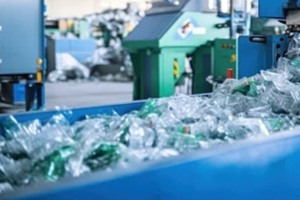August 18, 2025

Artificial intelligence (AI) is swiftly transforming plastics recycling, creating new opportunities and addressing long-standing operational challenges.
Innovations in technology enable the industry to enhance sustainability and efficiency, thereby cutting costs and improving outcomes. Industry leaders increasingly adopt AI solutions to streamline recycling processes, demonstrating a clear path toward sustainability and optimized resource utilization.
The plastics recycling industry struggles with significant limitations that affect efficiency, profitability, and environmental performance. Without precise sorting, traditional recycling often fails to recover valuable materials, resulting in increased waste and expense.
Processing constraints further hinder recycling facilities, limiting their capacity to handle large volumes efficiently and thereby increasing operational expenses, negatively impacting competitiveness.
Among the industry’s primary concerns are limited processing capabilities and high operational costs. Older sorting equipment cannot effectively manage assorted material streams, compromising purity and recycling rates.
Manual sorting is also labor-intensive and costly, with inefficiencies arising from human error and workforce shortages. These challenges collectively result in lower throughput and increased contamination levels, which drive operational costs higher and reduce economic viability.
To overcome these obstacles, AI technologies offer innovative solutions to revolutionize plastics recycling processes.
The Plastics Recycling Show Europe recently highlighted these solutions, emphasizing AI’s significant role across the recycling spectrum, from feedstock selection to final material sourcing.
These advancements substantially enhance the industry’s capacity to effectively manage and utilize recycled materials.
AI integration in sorting systems brings substantial advantages through sophisticated automation and intelligent machinery. Smart sorting equipment, guided by deep learning algorithms and convolutional neural networks, accurately identifies and categorizes plastic types at unmatched speeds.
Robotic arms driven by AI swiftly separate materials, dramatically increasing productivity and purity. The AI Innovation Hub showcased innovations from several companies, illustrating practical applications such as digital twins for real-time process optimization.
Automated quality control further enhances recycling operations, applying advanced data analytics to identify impurities in recycled plastic streams quickly. Predictive maintenance driven by machine learning reduces downtime by forecasting equipment needs, thus maintaining continuous operation and high material purity.
Throughput optimization and contamination reduction are measurable benefits of adopting AI-driven technologies. When materials are sorted and processed efficiently, facilities can produce more and spend less per unit.
In addition, increased sorting accuracy decreases contamination, so recycled plastics meet higher standards required for more specialized applications, such as food-grade packaging.
Implementing AI in recycling requires careful strategic planning regarding physical infrastructure and resources. Detailed infrastructure requirements must align with company-specific objectives, allowing for seamless technological integration and maximum productivity.
Investment in specialized hardware, including smart bins with sensor technology, sorting robotics, and predictive analytics systems, is essential. These technologies require powerful software platforms to manage complex data streams and facilitate seamless operation.
Advanced software infrastructure is required to integrate AI with existing recycling management systems, enabling streamlined processes and real-time operational oversight.

Having effective AI adoption requires the strategic allocation of resources. Adequate training programs must equip employees with the knowledge and skills to operate sophisticated AI systems efficiently, lowering potential transitional disruptions.
Financial planning must carefully assess budget allocations for acquiring new equipment, software licensing, and ongoing operational expenses to maintain economic sustainability throughout the implementation.
The economic advantages of implementing AI are both demonstrable and substantial. Cost savings become apparent as facilities optimize recycling processes, minimize manual labor reliance, and significantly decrease contamination.
AI-driven efficiency improvements typically yield rapid returns on investment, often justifying initial capital expenditures within relatively short periods. Through cost reduction and greater processing efficiency, recycling operations strengthen their market position and drive profitability.
AI also supports compliance with stringent environmental and quality regulations, which are increasingly significant in the recycling industry. Maintaining adherence to these standards provides a competitive edge and demonstrates a commitment to sustainable practices.
With AI support, certifications and emissions control measures become easier to manage. AI’s predictive capabilities assist companies in meeting stringent certification requirements by anticipating compliance risks and proactively addressing them.
Precise sorting also reduces potential contamination, lowering emissions and environmental impacts of recycling processes.
AI facilitates thorough material validation and rigorous process documentation for compliance and consumer confidence.
Enhanced traceability, powered by blockchain technology and AI, assures transparency throughout the material sourcing and processing stages. As a result, recyclers can confidently demonstrate compliance, enhancing marketability and customer trust.
AI innovations provide distinct opportunities for market expansion and diversification. Recyclers embracing AI technology can more readily meet the growing demand for recycled plastics, expanding their offerings and entering previously inaccessible markets.
AI-driven efficiency opens doors for market expansion by increasing production volumes, reducing costs, and elevating material quality.
Enhanced sorting accuracy allows recyclers to supply high-purity, specialized materials suitable for diverse industries, broadening their market scope. The growth potential enables product diversification, supporting recyclers’ adaptation to evolving market trends and demands.
Looking forward, AI will play an increasingly important role in shaping plastics recycling strategies and capabilities. Emerging trends suggest continuous advancements in sorting accuracy, predictive analytics, and even blockchain-enabled material traceability.
The demonstrated success of AI-based projects, such as the EU-funded RECLAIM initiative, directly demonstrates AI’s promising future in portable recycling facilities and broader material recovery programs.
Current technological roadmaps predict further integration of AI in developing more advanced robotic sorting systems and predictive analytics solutions. Continued investment in these innovations positions recyclers to effectively lead sustainability initiatives, meeting consumer expectations and regulatory pressures.

Plastics recycling is currently at the threshold of transformation, driven by a host of AI advancements. This positions industry partners to realize extraordinary efficiency, compliance, and profitability benefits.
Companies aiming to remain competitive and sustainably responsible can significantly benefit from joining PLASTICS, the Plastics Industry Association. Membership offers industry professionals essential updates on breakthrough innovations, participation in various recycling initiatives, and access to advocacy resources instrumental in driving forward industry-wide sustainability efforts.
PLASTICS and the Future Leaders in Plastics (FLiP) Committee are devoted to supporting and encouraging the next generation of plastics leaders who will play a crucial role in the innovation, technology and future of the plastics industry. FLiP’s mission is to provide young professionals under the age of 40 the exposure, education and resources they need to build lifelong careers in plastics. Want to join? Want to get your employees involved? Email: [email protected]